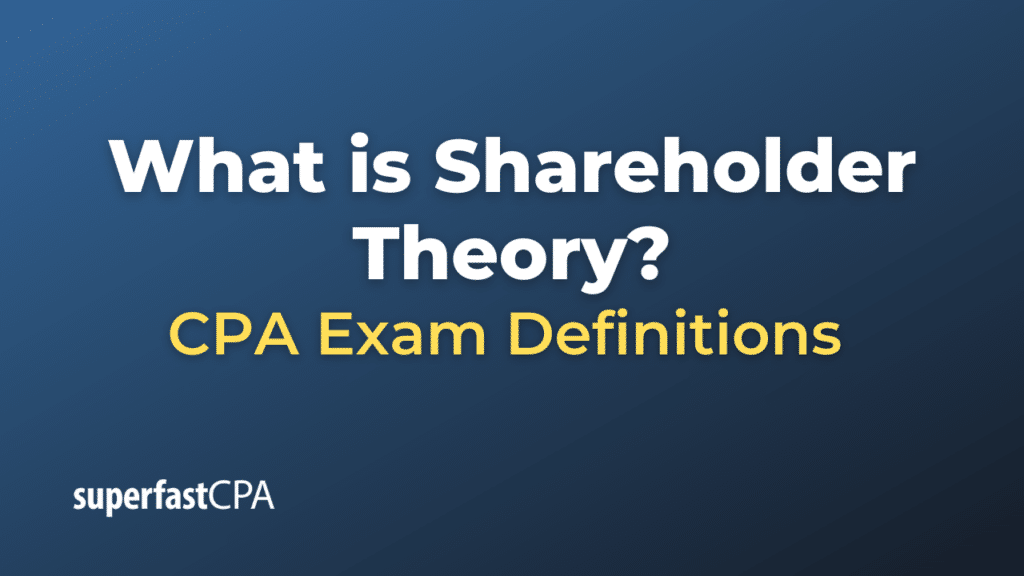Shareholder Theory
Shareholder theory, often associated with the economist Milton Friedman, posits that the primary responsibility of a corporation is to its shareholders. This responsibility is primarily understood in terms of maximizing shareholder value, typically reflected in the company’s stock price and dividends. The theory emphasizes that, within the bounds of the law and ethical practice, a company’s main objective should be increasing profits for its shareholders, given that they are the owners of the company and take on the risks associated with their investment.
Some key points about shareholder theory include:
- Economic Focus: The theory asserts that businesses operate in the realm of economics, and their primary purpose is to generate profits. This profit-centric approach is what differentiates businesses from charitable or social institutions.
- Agency Theory: Corporations are managed by executives who act as agents on behalf of the shareholders, the principals. It’s the fiduciary duty of these agents to act in the best interests of the principals, which, in this context, means maximizing shareholder wealth.
- Legal Foundations: In many jurisdictions, corporate law does require company directors to act in the best interests of shareholders. This often translates to a focus on profit-making and wealth maximization.
- Criticism & Alternatives:
- Shareholder theory has been criticized for potentially promoting short-term thinking and neglecting broader societal and environmental concerns.
- In contrast, stakeholder theory posits that companies have a responsibility not just to shareholders but to all stakeholders, including employees, customers, suppliers, the community, and the environment. This approach promotes a more holistic view of corporate responsibility.
- Friedman’s Perspective: In a famous 1970 article in The New York Times Magazine, Milton Friedman wrote: “The social responsibility of business is to increase its profits.” His argument was that businesses aren’t equipped to solve societal problems, and when they divert resources from profit-maximizing endeavors, they’re effectively imposing a tax and deciding how to redistribute this, which should be the role of the state or democratically-elected representatives.
Shareholder theory has been influential in shaping the modern corporate world, especially in Anglo-American business contexts. However, as concerns grow about issues like climate change, income inequality, and corporate social responsibility, debates about the roles and responsibilities of corporations in society have become more complex.
Example of Shareholder Theory
Let’s illustrate the concept of shareholder theory through a fictional scenario involving a tech company:
Example:
TechPioneer Corp. is a leading tech company that produces smartphones and related accessories. The company has seen substantial growth over the past years and has a large base of shareholders who expect continued growth in the stock price.
Scenario 1: Focus on Short-Term Profits (Driven by Shareholder Theory)
- Decision: The company learns about a cheaper, but slightly lower-quality, component that can be used in its next smartphone model. By using this component, TechPioneer Corp. can increase its profit margin on each phone sold.
- Outcome: TechPioneer Corp. decides to use the cheaper component, leading to higher profits in the next quarter. Shareholders are pleased with the increased dividends and rising stock price.
Scenario 2: Considering Long-Term Impact and Broader Stakeholders
- Decision: Some employees at TechPioneer Corp. raise concerns that the new component might reduce the overall durability of the smartphone, potentially leading to customer dissatisfaction and harm to the brand’s reputation in the long run. They also highlight that the component’s manufacturer has questionable labor practices.
- Outcome: The company’s leadership, while recognizing the immediate profit potential, decides not to use the cheaper component. They believe that ensuring customer satisfaction and adhering to ethical practices will bring more significant, sustainable value to shareholders in the long run.
In this example:
- Scenario 1 aligns more closely with the traditional interpretation of shareholder theory, where immediate profit maximization for shareholders takes precedence.
- Scenario 2 integrates aspects of stakeholder theory. The company considers the potential long-term implications for its brand reputation and ethical standing, which can indirectly influence shareholder value over a more extended period.
Both scenarios acknowledge the importance of shareholders, but the decision-making process varies based on the extent to which other factors and stakeholders are taken into consideration.













